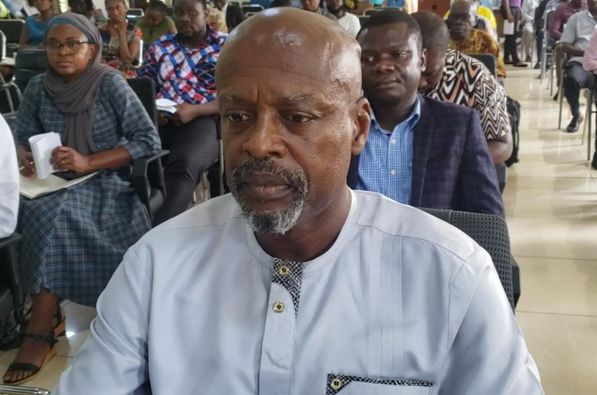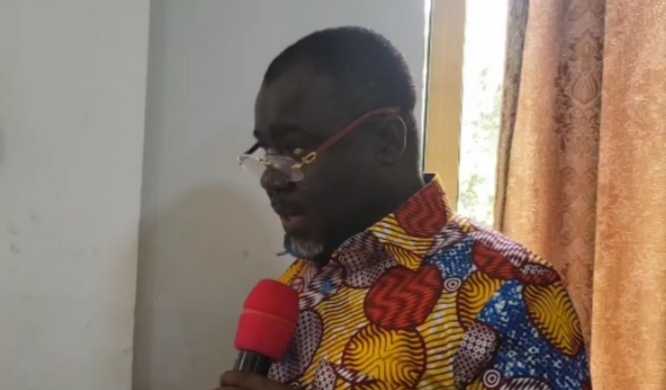Climate change has emerged as a defining global challenge, necessitating coordinated efforts from all nations to combat its effects and secure a sustainable future for the planet. In this regard, every country must take decisive action to address their greenhouse gas emissions. Ghana, like many others, faces this pressing concern and has identified the transport sector as a significant contributor.

To tackle this issue, the Ministry of Transport, in collaboration with the Ministry of Energy, took proactive measures by organizing an E-Vehicle workshop. This event was held at the Eastern Regional Coordinating Council’s conference room, seeking to gather valuable insights from stakeholders on a policy framework formulated by the government. The primary objective of this workshop was to explore viable strategies for transitioning towards electric vehicles (E-Vehicles) to curb emissions and pave the way for a more sustainable and environmentally conscious transport system.
In the year 2020, the global transport industry accounted for a staggering 7.3 billion metric tons of carbon dioxide emissions, underscoring the urgent need for sustainable solutions to mitigate its environmental impact. A significant portion of these emissions, forty-one percent, can be attributed to commercial vehicles, while medium and heavy trucks contribute 22 percent. This concerning trend prompted an investigation into Ghana’s vehicle statistics by the Driver and Vehicle License Authority (DVLA) as of 2022. The findings revealed a total of approximately 3.2 million registered vehicles in the country, with 72 percent powered by petrol engines, 27 percent by diesel engines, and less than 1 percent using other energy sources. Such reliance on fossil fuels significantly contributes to the environmental menace of carbon emissions. While the transportation sector undeniably plays a vital role in economic development, finding sustainable approaches to reduce its carbon footprint becomes a critical imperative for safeguarding the planet’s future
As we confront the challenge of developing suitable and sustainable transportation systems, electric vehicles (EVs) emerge as a promising long-term solution. Across the globe, a growing number of people are embracing the transition to electric mobility, with notable figures from various regions: 37 percent of vehicles in China, 28 percent in Europe, and 26 percent in North America were electric by the end of 2022.
Africa, too, is witnessing a surge in the adoption of EVs, signaling a promising shift towards environmentally conscious transportation alternatives. Notably, Kenya has emerged as a hub for electric vehicle assembly, with innovative projects like “Busigo” presenting an electric passenger vehicle capable of traveling up to 80km on a single charge. Collaborating with a Swiss company, Kenya has also introduced “Opibus,” further reinforcing the country’s commitment to sustainable transport. The Kenyan government, with a forward-looking vision, has proposed that by 2030, 5 percent of all imported vehicles will be electric, aiming to accelerate the nation’s journey towards a greener transportation landscape.
The momentum for electric mobility is not confined to Kenya alone, as Rwanda joins the electric revolution by taking significant strides in adopting EVs. Even in Nigeria, individuals are making a difference by replacing traditional fuel-powered cars with battery-powered systems, contributing to the broader push for cleaner transportation.

The Government of Ghana has been steadily embracing the paradigm shift towards sustainable transportation, with a significant focus on electric vehicles (EVs). Over the years, the country has witnessed a notable rise in the adoption of electric vehicles, evident in the approximately 17,000 EVs (Hybrids included) registered with the Driver and Vehicle License Authority (DVLA) from 2016 to 2021. This surge can be attributed to the Drive-Electric initiative, a collaborative effort between the Ministry of Energy and the Energy Commission in 2019, which actively promotes the alternative and productive use of electricity beyond conventional purposes, encouraging the populace to invest in electric cars. This initiative came about when the Energy Commission realized that the country enough electricity capacity of over 5000MW after solving the energy crisis, with peak demand of about 3500MW which the excess had to be used.

The Government of Ghana has taken center stage as the government sets its sights on achieving net-zero emissions by 2070. To realize this ambitious goal in the Transport sector, the government has crafted a comprehensive policy framework, envisioning a future where Battery Electric Vehicles become the dominant mode of transport. However, the transition to electric mobility has raised concerns among some sections of the populace, particularly regarding the perceived high costs of electric vehicles and batteries, potential fire hazards during accidents and charging, and apprehensions about the limited range for long journeys. In response, the government is committed to fostering sustainable adoption and utilization of safe and affordable electric vehicles, thereby curbing emissions and enhancing the well-being of the population. So the mission of the policy is to have sustainable adoption and utilization of safe and affordable electric vehicles to reduce emissions and improve the well-being of the populace.
To realize this vision, the government has established key objectives. Firstly, it aims to promote BEVs vigorously, generating interest and fostering widespread adoption among the public. Secondly, it will actively support the deployment of electric vehicles and develop a robust supply chain for both EVs and spare parts. Thirdly, the government is committed to ensuring sufficient electricity capacity to meet the growing demand for electric vehicles. With the current electricity capacity exceeding 5000MW, and plans to add more electricity generating stations, Ghana is poised to power its electric mobility revolution effectively.
Furthermore, the government recognizes the importance of education and research in driving the transition to EVs. Tertiary institutions will play a crucial role in offering courses on electric vehicles and conducting research to further advancements in this domain. Additionally, the government is actively addressing environmental concerns by implementing proper waste disposal mechanisms to manage batteries responsibly, steering clear of hazardous e-waste dumping sites.
One of the core values and principles guiding the transformation is health and safety. The government intends that EVs must be engineered to ensure the utmost safety of passengers and occupants, eliminating any risk of electrocution. Moreover, the charging process must be designed to prevent incidents of fires, ensuring a secure EV experience. Clean Environment stands as another cornerstone value. By embracing electric vehicles, Ghana aims to drastically reduce its carbon footprint. As EVs produce zero tailpipe emissions, they contribute significantly to a greener and healthier environment. Equity and Fairness are central to the electric mobility vision. Ghana’s strategic approach aims to make EV adoption accessible to all citizens, irrespective of socio-economic backgrounds. Initiatives such as incentives for EV usage strive to create an inclusive and equitable transition.
With the objectives in place, Ghana’s EV revolution is fortified by strategic initiatives and legislative measures, spearheading a cleaner and more sustainable transportation landscape.
The strategies devised to achieve the objectives encompass multiple fronts. Education plays a pivotal role, with the collaboration of the Ministry of Transport, Education, and Information. An informative website will provide vital information on electric cars, fostering awareness and interest in EV adoption. To set an example for the nation, Government institutions will integrate electric vehicles into their fleets. The Ministry of Transport’s acquisition of a Hyundai Kona EV exemplifies the commitment to green transportation. Charging infrastructure development is crucial to facilitate EV adoption. Offices will be equipped with electric or solar charging points, and garages will be transformed into solar panel roofs. This not only promotes EV charging but also supports sustainable energy practices.To promote domestic industries and generate employment opportunities, Ghana will be venturing into local manufacturing and assembly of electric vehicles. Companies like Kantanka have already commenced building electric vehicles, while entrepreneurs are assembling fully electric auto rickshaws popularly known as Pragya, and motorcycles. Leveraging the discovery of lithium deposits, Ghana intends to establish battery manufacturing factories. This strategic move aims to reduce battery import costs while transforming Ghana into a regional hub for lithium-powered batteries. Moreover, Legislative measures transitioning laws and standards will be established to ensure seamless integration, while training programs will equip wayside mechanics with essential skills to service electric vehicles effectively.

The policy represents a well-thought-out and promising step in the right direction, yet it was not without concerns raised by stakeholders during the meeting. One notable suggestion came from a Metro Mass Transport representative, proposing that the educational course on electric vehicles should commence at the primary school level rather than waiting until tertiary education. This move aims to instill early awareness and understanding of electric mobility among the younger generation.
Moreover, several participants expressed apprehension about the potential impact of lengthy charging times at public charging points, particularly for essential services such as emergency response teams. To address these concerns, it was emphasized by the policy specialist that charging electric vehicles differs significantly from conventional fuel engines. Electric vehicles can be conveniently charged at home or designated charging stations, providing flexibility and accessibility to EV owners.
Despite the concerns raised, the overall sentiment remained positive, with stakeholders acknowledging the importance of promoting electric mobility in Ghana. As the policy evolves, incorporating valuable feedback from stakeholders and addressing their concerns will be vital to ensure a successful and inclusive transition to a greener and more sustainable transportation future.

E-VEHICLE STAKEHOLDER’S WORKSHOP AT EASTERN REGIONAL COORDINATING COUNCIL
Posted in Events, General News.
